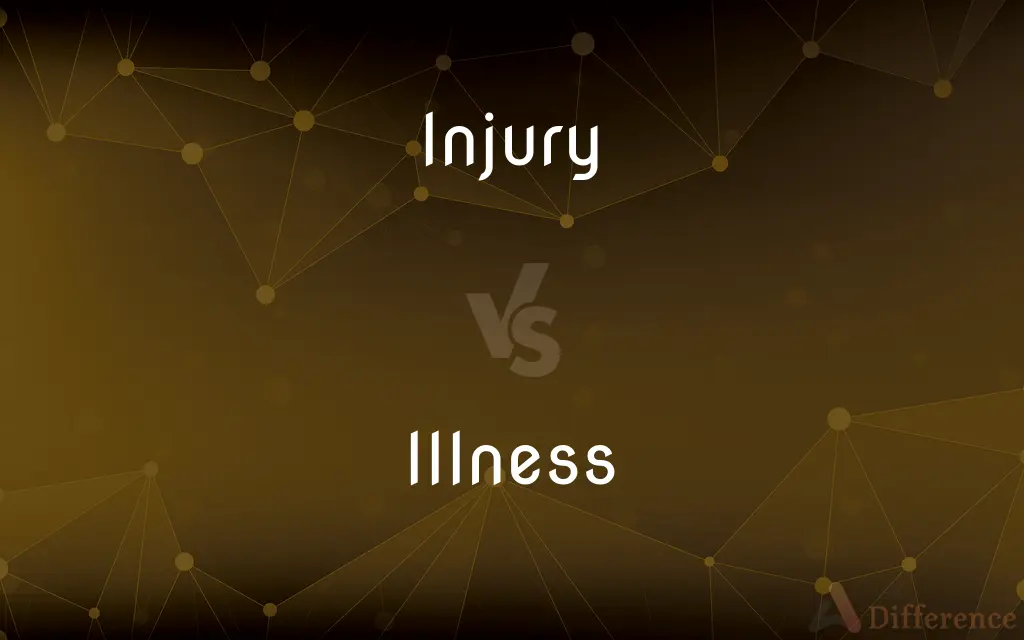Injury vs. Illness — What's the Difference?
By Fiza Rafique & Maham Liaqat — Updated on April 4, 2024
Injury refers to physical harm or damage to the body caused by external force, while illness denotes a condition affecting the body or mind's health, typically from disease.

Difference Between Injury and Illness
Table of Contents
ADVERTISEMENT
Key Differences
Injuries are often the result of accidents, physical activities, or external forces causing harm to the body, leading to cuts, fractures, or bruises. On the other hand, illnesses are health conditions caused by infection, genetic predisposition, environmental factors, or lifestyle choices, ranging from the common cold to chronic diseases like diabetes.
While injuries can be classified as acute, resulting from a singular event, or chronic, stemming from repetitive stress or overuse, illnesses are categorized into infectious, caused by pathogens, and non-infectious, resulting from other factors like genetics or environment.
The treatment for injuries usually involves immediate care such as first aid, rest, surgery, or physical therapy, aimed at healing or managing the physical damage. Conversely, treating illnesses may require medication, lifestyle adjustments, or long-term management strategies to alleviate symptoms or cure the disease.
Injuries are typically identifiable by physical signs and symptoms like pain, swelling, or bleeding, making diagnosis straightforward in many cases. Illnesses, however, can present a wide range of symptoms affecting various body systems, often requiring medical tests for diagnosis.
Prevention of injuries often focuses on safety measures, proper technique during physical activities, and use of protective gear. Preventing illnesses may involve vaccination, hygiene practices, and healthy lifestyle choices to boost immunity and reduce risk factors.
ADVERTISEMENT
Comparison Chart
Definition
Physical harm caused by external force.
Condition affecting body or mind's health.
Causes
Accidents, physical force, external factors.
Infections, genetic factors, environmental factors.
Types
Acute (immediate), chronic (repetitive stress).
Infectious (pathogen-caused), non-infectious (other causes).
Treatment
First aid, rest, surgery, physical therapy.
Medication, lifestyle changes, management strategies.
Symptoms
Visible signs like cuts, swelling, localized pain.
Varied, often requiring tests for diagnosis.
Prevention
Safety measures, protective gear, proper technique.
Vaccination, hygiene, healthy lifestyle choices.
Compare with Definitions
Injury
Physical Harm.
A broken bone from falling off a bike is a common type of injury.
Illness
Health Condition.
Diabetes is a chronic illness affecting the body's ability to process sugar.
Injury
Immediate Care.
Applying ice to a sprained ankle is a first step in treating such an injury.
Illness
Long-term Management.
Managing heart disease often involves medication and lifestyle adjustments.
Injury
Visible Signs.
Bruises and cuts often signal an injury to the skin or deeper tissues.
Illness
Varied Symptoms.
Illnesses like the flu can cause symptoms ranging from fever to muscle aches.
Injury
Recovery Process.
Physical therapy can be crucial for recovering from a severe injury.
Illness
Diagnostic Tests.
Blood tests can help diagnose illnesses that aren't immediately apparent.
Injury
Prevention Practices.
Wearing a helmet while cycling can prevent head injuries.
Illness
Lifestyle Influence.
A balanced diet and regular exercise can reduce the risk of many illnesses.
Injury
Injury, also known as physical trauma, is damage to the body caused by external force. This may be caused by accidents, falls, hits, weapons, and other causes.
Illness
A disease or period of sickness affecting the body or mind
I've never missed a day's work through illness
He died after a long illness
Injury
An instance of being injured
She suffered an injury to her back
Illness
Poor health resulting from disease of body or mind; sickness.
Injury
Damage to a person's feelings
Compensation for injury to feelings
Illness
A disease.
Injury
Damage or harm done to or suffered by a person or thing
Escaped from the accident without injury.
A scandal that did considerable injury to the campaign.
Illness
The quality of being disagreeable or unpleasant.
Injury
A particular form of hurt, damage, or loss
A leg injury.
Illness
Evil; wickedness.
Injury
(Law) Violation of the rights of another party for which legal redress is available.
Illness
(countable) An instance of a disease or poor health.
Her grandmother had passed away after a long illness.
Suffer form a severe illness
A mild illness
Injury
(Obsolete) An insult.
Illness
(uncountable) A state of bad health or disease.
Many working days this year have been lost through illness.
Injury
Damage to the body of a living thing.
The passenger sustained a severe injury in the car accident.
Illness
The condition of being ill, evil, or bad; badness; unfavorableness.
Injury
Other forms of damage sustained by a living thing, e.g. psychologically.
Illness
Disease; indisposition; malady; disorder of health; sickness; as, a short or a severe illness.
Injury
The violation of a person's reputation, rights, property, or interests.
Slander is an injury to the character.
Illness
Wrong moral conduct; wickedness.
Injury
(archaic) Injustice.
Illness
Impairment of normal physiological function affecting part or all of an organism
Injury
(obsolete) To wrong, to injure.
Injury
Any damage or hurt done to a person or thing; detriment to, or violation of, the person, character, feelings, rights, property, or interests of an individual; that which injures, or occasions wrong, loss, damage, or detriment; harm; hurt; loss; mischief; wrong; evil; as, his health was impaired by a severe injury; slander is an injury to the character.
For he that doeth injury shall receive that that he did evil.
Many times we do injury to a cause by dwelling on trifling arguments.
Riot ascends above their loftiest towers,And injury and outrage.
Injury
Any physical damage to the body caused by violence or accident or fracture etc.
Injury
An accident that results in physical damage or hurt
Injury
A casualty to military personnel resulting from combat
Injury
An act that injures someone
Common Curiosities
What is an injury?
An injury is physical harm or damage to the body caused by external force or trauma.
What is an illness?
An illness is a condition that impairs a person's physical or mental health, often due to disease or infection.
How can injuries be prevented?
Injuries can be prevented by adopting safety measures, using protective gear, and following proper techniques during activities.
Can illnesses be infectious?
Yes, some illnesses are infectious, caused by pathogens like bacteria, viruses, or fungi, and can be spread from person to person.
What are some common treatments for illness?
Treatments for illness can include medications, therapy, lifestyle changes, and in some cases, surgery.
Are all injuries visible?
Not all injuries are visible; some, like concussions or stress fractures, may require medical imaging to diagnose.
Can injuries lead to long-term health issues?
Yes, injuries, especially if not properly treated, can lead to chronic pain, disability, or other long-term health issues.
How do vaccinations prevent illness?
Vaccinations stimulate the immune system to protect against specific infectious diseases, reducing the risk of illness.
What role does lifestyle play in illness?
Lifestyle factors such as diet, exercise, and smoking can significantly impact the risk and severity of certain illnesses.
How are chronic illnesses managed?
Chronic illnesses often require ongoing treatment and lifestyle adjustments to manage symptoms and maintain quality of life.
Can lifestyle changes cure illnesses?
While lifestyle changes can significantly improve health and manage symptoms, not all illnesses can be cured through lifestyle alone.
Can mental health be affected by illness?
Yes, mental health can be significantly affected by both the direct impact of physical illnesses and the stress they cause.
Is immediate care always necessary for injuries?
Immediate care is crucial for severe injuries, but minor injuries may be treated at home with rest, ice, compression, and elevation (RICE).
What is the difference between acute and chronic injuries?
Acute injuries result from a specific incident or trauma, while chronic injuries develop over time due to repetitive stress or overuse.
What are non-infectious illnesses?
Non-infectious illnesses are conditions not caused by infectious agents, such as diabetes, cancer, and heart disease.
Share Your Discovery

Previous Comparison
Pirate vs. Buccaneer
Next Comparison
Ignorant vs. IdiotAuthor Spotlight
Written by
Fiza RafiqueFiza Rafique is a skilled content writer at AskDifference.com, where she meticulously refines and enhances written pieces. Drawing from her vast editorial expertise, Fiza ensures clarity, accuracy, and precision in every article. Passionate about language, she continually seeks to elevate the quality of content for readers worldwide.
Co-written by
Maham Liaqat













































